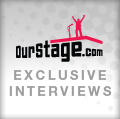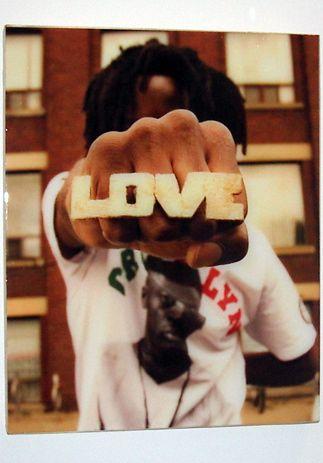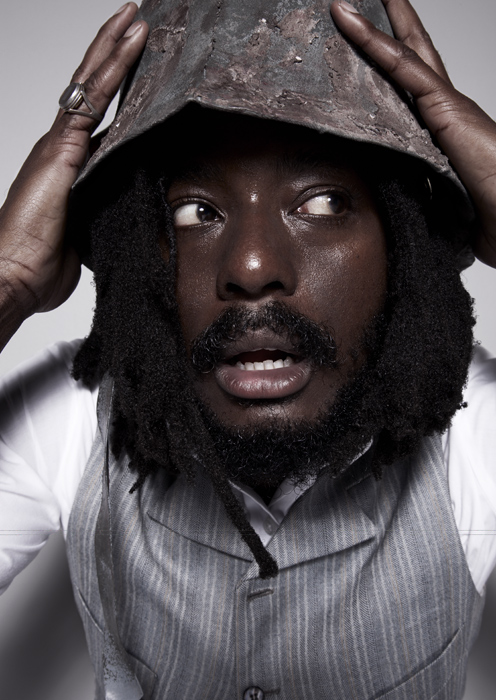Q&A With K-OS
 Hip hop and indie rock isn’t the most common mix of genres. Few artists can really pull it off, but Canadian act k-os falls into this narrow category. To label him a hip hop artist wouldn’t truly encompass his sound or experience. While some songs boast upbeat hip hop flavor with a turn-table-esqe “old school” vibe, other songs contain an indie style melody over rock-influenced drums. Just when you think you’ve got k-os figured out, he’ll throw a completely new style at you. Check out his video for “I Wish I Knew Natalie Portman”
Hip hop and indie rock isn’t the most common mix of genres. Few artists can really pull it off, but Canadian act k-os falls into this narrow category. To label him a hip hop artist wouldn’t truly encompass his sound or experience. While some songs boast upbeat hip hop flavor with a turn-table-esqe “old school” vibe, other songs contain an indie style melody over rock-influenced drums. Just when you think you’ve got k-os figured out, he’ll throw a completely new style at you. Check out his video for “I Wish I Knew Natalie Portman”
With an eclectic collection and four studio releases under his belt, k-os is no stranger to the industry. Over the years he’s been nominated for and won numerous Juno awards, and received many positive reviews for his releases. While k-os is known to be outspoken about his beliefs, he tends to offer a positive image in his music. He recently performed for the opening ceremony at the Winter Olympics in February alongside other notable Canadian artists. He also shared the stage with Drake on a national college tour earlier this year. OS got a hold of him to ask about his touring, his latest release and his techniques for creating such a genuine sound.
OS:Where does the name k-os come from?
K-OS: Yeah, it was an acronym for “Knowledge of Self” and that basically came about just from the stuff I think music is. Music is a process for me of finding myself and knowing myself. So, over time it just became the craziest idea of chaos, of things being out of order or inexplicable or of some kind of upheaval leading to some kind of knowledge of self.
OS: Why do you choose to do almost everything yourself, in terms of production, performance and writing lyrics?
K-OS: I’m kind of a control freak that doesn’t really understand the music from a theoretical basis. So, I think the lack of knowledge makes me obsess a little bit more about seeing myself in the end result. I think if I knew more about music, I wouldn’t be that much of a control freak. But, I think because everything I do, I do by ear, whether it’s singing, or rapping, or playing instruments. I’ve never been trained on anything. Over the years, I’ve just wanted to feel myself in the music more, so I’ve started to take things on myself, you know?
OS: So you haven’t had any real “formal” training?
K-OS: No, never. Not at all. I mean the only real formal training I’ve had is having to come up with music under pressure. I think that’s sort of a school in itself when you’re making records. You have to follow up certain things. You kind of have to, like, be in the zone to create.
 OS: Your stage show is very different form a lot of hip hop acts. Do you feel that live instruments and limited backing tracks are important for a strong live performance?
OS: Your stage show is very different form a lot of hip hop acts. Do you feel that live instruments and limited backing tracks are important for a strong live performance?
K-OS: I think hip hop comes from two turn tables and a microphone. It’s the hip hop basis, and I think that’s always going to work if you learn to master that. But, technology and times have changed those sounds, and you don’t see many hip hop bands doing that anymore. In fact, you see a lot of guys, whether it’s Snoop or Drake, with bands now and I think that’s a great thing because that’s where the music came from. Sampling was just people’s ideas of wanting to play the music themselves, and they couldn’t. So, they sampled from records.
So, I’m hard-pressed to kind of make a statement on what hip hop should sound like, but in my case, I feel like live instruments on stage make me feel a certain way. The sonics of a live instrument on stage give me a different feeling than just performing over DAT tapes or turn tables. Mind you, for the next couple dates we do, the Drake tour and this upcoming Flobots tour, we’re kind of forced to have a smaller configuration, because my band’s pretty big with a lot of inputs. This tour has two or three people on it, this one we’re about to jump on with The Flobots and Trouble Andrew and some different people. So, we just kind of wanted to keep it simple. So we are being ironically reverted back to the turn tables. My DJ, Lil Jazz being the main-stay, sort of like the maestro of the whole thing. It gives the show a completely different flow when your DJ is your drummer, you know?
So, it’s a great experience, man. We have many little configurations of the band. We can break it down to me on guitar with another guitar player. We’ve gone, you know, all acoustic: everyone playing their instrument but acoustically. So, there’s many different things we can try to do, you know? We just try to go with what best fits the format for which we’re playing.
OS: Being such a diverse artist, what genre of music and what other artists do you feel most comfortable performing with?
K-OS: There’s none really. I feel like I could perform for anyone. From the Kings of Leon or U2 to like, The Clips or, you know, Drake. I just love music and I find it a challenge to have to try and fit in with a band, as opposed to saying “These are the bands I want to play with always.” I mean, that’s kind of the thing. I want to play with many different people, and hopefully over my musical life I’ll get to play with as many diverse bands as possible. I mean, thanks for making the point about the diversity and all the different genres, but in that way, it kind of makes me at the core not want to just stick to one type of genre and play to as many people as possible.
OS: You’ve recently come off of a college tour with Drake. How does your music relate with a mainstream rap demographic vs. something like an indie/pop demographic?
K-OS: I think it was cool. I mean, it all comes down to skill and what are your skills. I did a lot of free-styling, took the beats out and really rapped to the crowd. I think at the core of hip hop is that kind of respect for those skills. If someone can freestyle, you know if you’re skilled in hip hop, that’s something they can’t really take away from you. As far as the DJ, having little solo’s and cutting up records. The crowds enjoy that because no matter how far the music gets from hip hop, that’s the core of hip hop. So, once you showcase the major bottom line skills which are b-boying and breakdancing, turn-tableing and emceeing. If you’re skilled in those capacities and you somehow, in your show, showcase that, you can always connect with a hip hop crowd. Can you do that for the whole show and captivate them? Probably not. But, if you can find some cool places to really break it down, that would be awesome.
OS: You played the closing ceremony of the Olympics in Vancouver this year. Was your performance different knowing that you were playing for the entire world?
K-OS: Not really, because, especially when you’re on a stage that high and big, you’re only really playing to the people immediately in front of you. In that case, for the Olympics, there was really no one in front of us because we were on the side stage. So it all goes back to some weird idea that you really just have to perform with your boys on stage and play to what’s immediately in front of you in those situations. You can’t really think “Okay, what are a million people going to think?” You just have to play for the people immediately in front of you, and that’s the hard part. But, otherwise, I had so much fun, and I didn’t really sweat how many people were watching. I was just trying to have a good time on stage, you know?
 OS: Can you speak a little bit about the lyrical themes that run through your latest release Yes!?
OS: Can you speak a little bit about the lyrical themes that run through your latest release Yes!?
K-OS: I think that the whole thing about Yes! is somebody finding a point back in their life where they enjoyed music in a different way. I think the longer you do music, the more you’ll fall in and out of love with different types of music. Yes! is more about a guy who’s falling in love with the reasons he first started doing music and embracing those reasons. So, that’s really the theme throughout with songs like “Zamboney” and “Burning Bridges” and others. Just kind of captivating or recapturing an idea of music I had when I was maybe younger or when I first got signed in 1998. That’s really the theme: a rebirth. And the color red, which is the color of the album, which signifies passion.
OS: The song “4321” is a reference to Feist’s “1234”. What statement were you trying to make with this reference?
K-OS: I don’t know. I think I was just trying to say that I think all great music comes out of intense relationships with people and human beings. When you have a certain bond with people musically or emotionally, you’re affected by their music. I don’t know, I think sometimes things in humanity come down to “Battle of the Sexes”. You know, being friends with people and you both have careers and stuff. The bottom line, you love each other but also, too, you compete against each other. That was kind of my way of acknowledging, you know, that there are a lot of people. From Broken Social Scene to Metric, they’re my friends, right? You know, we bounce things of each other, but they’re also the friendly competitors that you exist with in a very small environment.
So, “4321” was just kind of like saying “Why do we do that? Why is there competition amongst friends?” But also too, that you just can’t really stop it because the song’s actually doing that while you’re doing it.. And then it was just a good little hip hop ditty that if people don’t know about that, they can just sort of like nod their head to it, you know? The numbers, the running down of “4321” to zero, you know ground zero or just keeping things simple. All those kinds of themes run through that song.
OS: So you’re kicking off a tour with the Flobots. Is that just a US tour?
K-OS: Yeah that’s just an American spot. Yeah, I’m pumped. I’m very excited to see America for real and not through the television and meet people and come across faces. I think that’s the most exciting thing of the last 6 months is just being in America and you know, being a part of it as opposed to just seeing it on TV or reading in a magazine which I did for so much of my musical life. So, I’m excited about that for sure.
If you missed k-os’ American dates, check out some of his upcoming shows overseas:
Sunday, August 1st
Splendour in the Grass – Brisbane, AUS
Tuesday, August 3rd
Prince Bandroom – Melbourne, AUS
Wednesday, August 4th
The Oxford Art Factory – Sydney, AUS
Saturday, August 7th
Summer Sonic Festival – Tokyo, JPN
Sunday, August 8th
Summer Sonic Festival – Osaka, JPN
 Hip hop and indie rock isn’t the most common mix of genres. Few artists can really pull it off, but Canadian act k-os falls into this narrow category. To label him a hip hop artist wouldn’t truly encompass his sound or experience. While some songs boast upbeat hip hop flavor with a turn-table-esqe “old school” vibe, other songs contain an indie style melody over rock-influenced drums. Just when you think you’ve got k-os figured out, he’ll throw a completely new style at you. Check out his video for “I Wish I Knew Natalie Portman”
Hip hop and indie rock isn’t the most common mix of genres. Few artists can really pull it off, but Canadian act k-os falls into this narrow category. To label him a hip hop artist wouldn’t truly encompass his sound or experience. While some songs boast upbeat hip hop flavor with a turn-table-esqe “old school” vibe, other songs contain an indie style melody over rock-influenced drums. Just when you think you’ve got k-os figured out, he’ll throw a completely new style at you. Check out his video for “I Wish I Knew Natalie Portman” OS: Your stage show is very different form a lot of hip hop acts. Do you feel that live instruments and limited backing tracks are important for a strong live performance?
OS: Your stage show is very different form a lot of hip hop acts. Do you feel that live instruments and limited backing tracks are important for a strong live performance? OS: Can you speak a little bit about the lyrical themes that run through your latest release Yes!?
OS: Can you speak a little bit about the lyrical themes that run through your latest release Yes!?